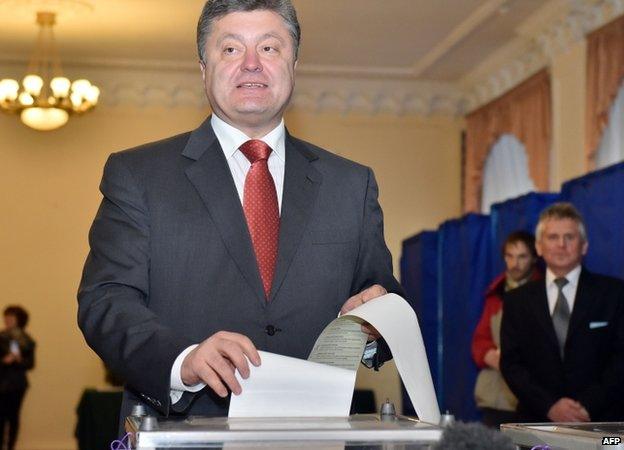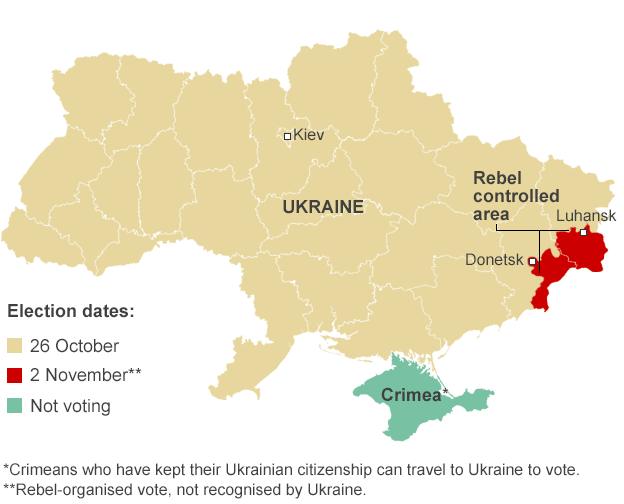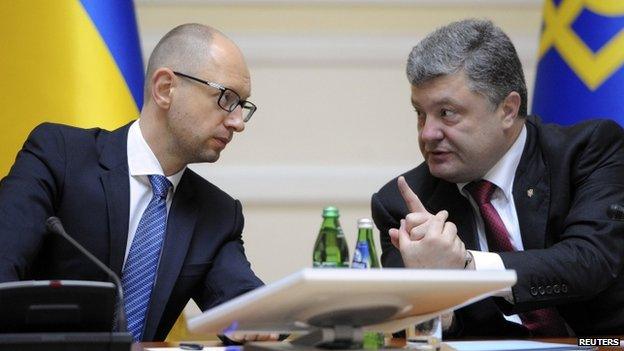Balancing act for Ukraine's Petro Poroshenko
- Published

Though voter turnout was high in Kiev where Petro Poroshenko voted, it was low in the south and east
Ukraine's snap parliamentary election on Sunday resulted in a massive shift in the political landscape, creating for the first time what appears to be a pro-Western majority backing wide-ranging reforms.
But the extent of this revolution at the ballot box is still unclear. The vote could produce a steam-roller super majority of two-thirds of the deputies for President Petro Poroshenko. Or it could prepare the ground for even more political turmoil.
At the moment, pro-government parties have swept the proportional vote, which determines half of parliament's 450 seats. Exit polls showed the parties of President Poroshenko, Prime Minister Arseniy Yatseniuk and mayor of the western city of Lviv, Andriy Sadoviy, winning the top three spots.
.gif)
Mr Poroshenko claimed that more than three-quarters of the electorate "powerfully and irreversibly" supported a pro-European course.
"I asked you to vote for democratic, reformist, pro-Ukrainian and pro-European majority. Thank you for hearing and supporting this call," Mr Poroshenko said on his website.
However, with great power also comes great responsibility. If he fails to deliver on the promises and demands of the Maidan revolution, he will have no excuses left. In gambling vernacular, he now finds himself in the position of "put up, or shut up".
He also risks going too far. Since he might not face substantive opposition, he could have a free hand to push through bad policies as well.

This is particularly dangerous, since - despite the seeming consensus on a European trajectory - Ukraine is still to a degree a divided country.
Preliminary election results indicate that turnout was low in many eastern and southern regions. What's more, the Opposition Bloc party, which consisted of the remains of former President Viktor Yanukovych's party, is so far winning in key, supposedly government-friendly, areas such as Kharkiv and Dnipropetrovsk.
The mood in Donetsk and Luhansk, after suffering through months of brutal fighting, is even more ill-disposed towards Kiev. It would seem Mr Poroshenko would be wise to tread carefully when pursuing policies unpopular in the east.
'European values'

Petro Poroshenko (R) and Arseniy Yatseniuk (L) are likely to form a coalition with other parties
Moreover, not all of the reforms will be universally welcomed, regardless of the region. Raising gas prices to market levels could potentially unleash a public backlash. Streamlining bureaucracy will affect perhaps tens of thousands of government workers and their families.
The pro-government camp itself is also potentially a source of unrest, divided as it is among a variety of personalities, ambitions and different opinions on how to tackle Ukraine's manifold problems.
Mr Poroshenko and Mr Yatseniuk, for example, could not unite in a single party before the election. Many saw this as an example of Ukrainian politics-as-usual, driven sometimes more by personalities and egos than by issues.
Politicians across the political spectrum also says that they are for "European values" and "rule of law". But what that actually means to them personally, when push comes to shove, is still to be discovered.
In the end, what's most important is that there's a general agreement - and a consuming desire - among a large number of the political class to change the how the system works in Ukraine. To do something.
And if they don't, there are masses of people who are ready to take to the streets to remind them through protests - or more extreme measures.